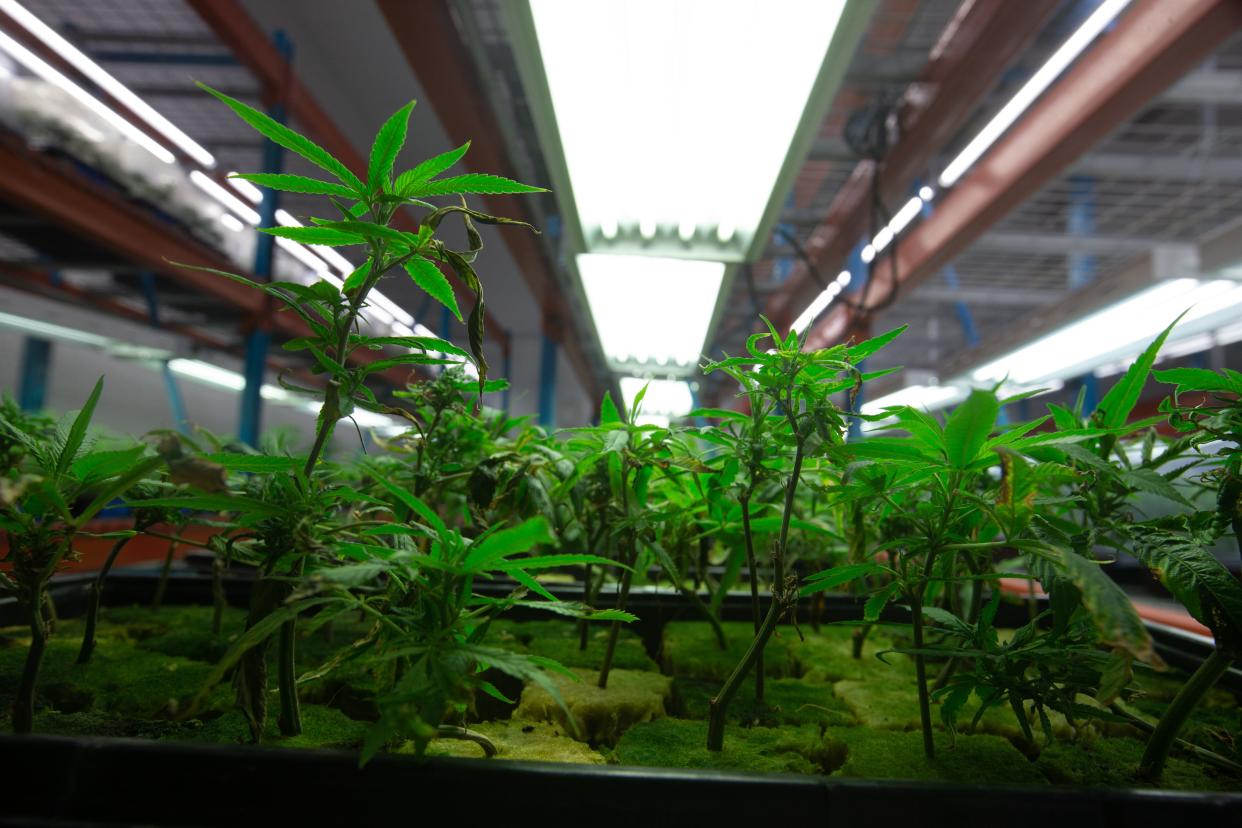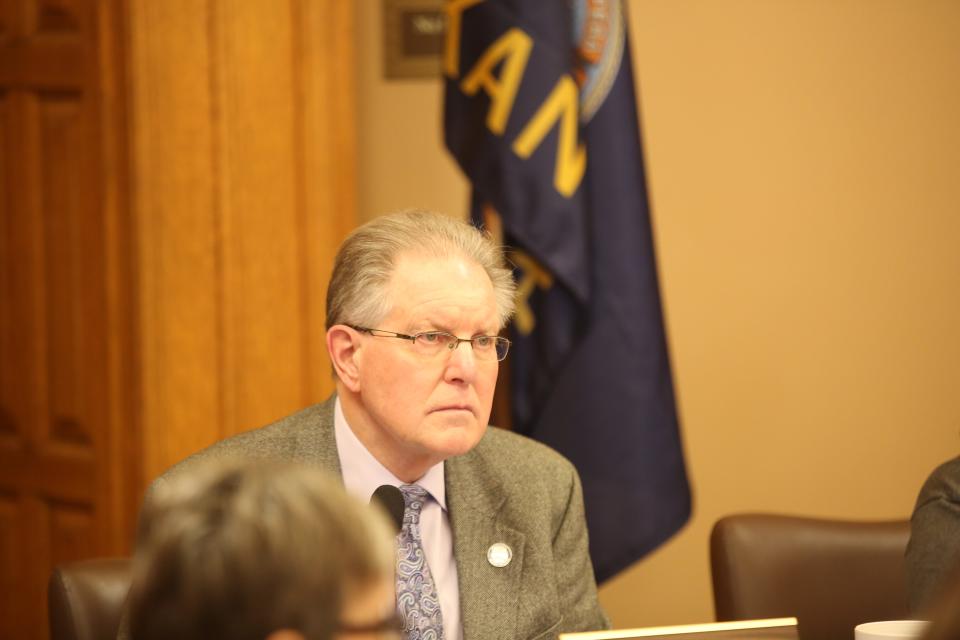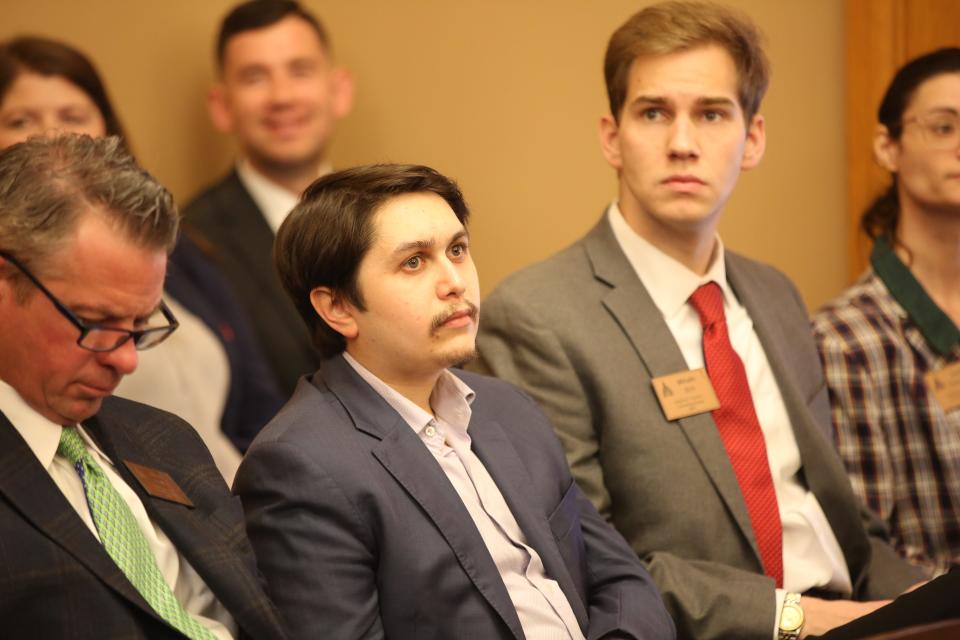Marijuana opponents descend on Kansas Statehouse, as hopes for legalization bill dim

A parade of individuals skeptical of marijuana legalization spoke out in a hearing Wednesday in the Kansas Statehouse, a move that signals a potential death knell for a proposed medical cannabis bill in 2023.
A top Oklahoma law enforcement official compared pro-cannabis arguments to communism. Johnson County District Attorney Steven Howe said proponents were akin to snake oil salesmen. And others argued that the experience of other states have raised public health and safety concerns.
"The fact that we’ve taken our time in the state of Kansas doesn’t make us wrong," Howe said. "Just because other states have gone off the cliff doesn’t make it right."
Kansas has been in the throes of a debate over whether or not to legalize medical marijuana. A reticence on the part of the Kansas Senate has stalled efforts, despite popular support for the idea and robust cannabis programs in Colorado, Missouri and Oklahoma.
More:Kansas lawmakers must decide who will thrive with medical marijuana — if bill even advances

Sen. Mike Thompson, R-Shawnee, who chairs the Senate and Federal Affairs committee that held the hearings Wednesday and Thursday, said he was uncertain about the fate of a medical cannabis bill this session but said the data presented during the hearings was compelling and needed further study.
"Until we look at this data seriously, we're putting the cart be before the horse," Thompson told reporters. "We need to understand what the impact is going to be on the state of Kansas."
Meanwhile, the author of the bill, Sen. Jeff Longbine, R-Emporia, said in an interview that the hearings were "probably" pretense to kill the legislation in 2023.
"I would be surprised if it did (have a hearing)," Longbine said.
Despite initial progress, critics sound alarm on Kansas marijuana proposal
In 2021, the Kansas House took the historic step of approving a bill to legalize medical cannabis, a move that seemed to put the state on the precipice of joining 37 other states with a public-access medical marijuana program.
But 2022 brought deadlock between House and Senate negotiators, and leadership in the Senate has been lukewarm on the idea.
Senate President Ty Masterson, R-Andover, committed to holding hearings on the matter earlier this year but also said he is "not going to be shamed into doing it."
Sen. Cindy Holscher, D-Overland Park, a longtime proponent of medical marijuana, noted that proponents of the bill were not approached about speaking during the hearing Wednesday and that the list of presenters was unveiled at the last minute.
"Leadership may not want to move forward with any type of medicinal cannabis bill, and this is the information they can point to as reasoning," she said. "Whether it is accurate or not is another question."
Instead of a more typical hearing on Senate Bill 135, the Senate Federal and State Affairs Committee instead elected to hear from four critics of marijuana legalization nationally. Howe was the only one from Kansas to present.
Oklahoma was a frequent target of criticism. The Sooner State legalized medical marijuana via ballot initiative in 2018 and its regulatory framework led to a boom in dispensaries and growing facilities alike.
Kansas' southern neighbor has the most dispensaries per-capita of any state in the country. Some have argued the low barrier to entry has spurred on the state's cannabis industry in a way few other regions can match, though concerns have been raised about out-of-state and even international owners entering the market.
Brian Surber, deputy director of the Oklahoma Bureau of Narcotics, said the state had the largest black market for weed in the country.
Proponents of legalization in Kansas have noted their proposal has far stricter guardrails, with Holscher acknowledging that Oklahoma was a model to avoid.
"We had so much information that wasn't relevant to what we are trying to do here and out of context to a program that we're trying to put together for Kansas," Holscher said. "That feels like a disservice to the voters and the people out there who are supportive of medicinal cannabis."
But Surber dismissed that notion, arguing no program could be properly constructed.
"They’ll probably say let's do it differently," Surber said. "It reminds me of people who support communist regimes, who support socialism. They say, ‘Well, Cuba wasn’t done right.' Because every one that has been done has been a failure."
Hearing sees debate over medicinal benefits of marijuana
Major medical groups have not rendered a clear verdict on the efficacy of marijuana for medical purposes.
"Whether smoking or otherwise consuming marijuana has therapeutic benefits that outweigh its health risks is still an open question that science has not resolved," Nora Volkow, director of the National Institute on Drug Abuse, said in a 2020 report. "Although many states now permit dispensing marijuana for medicinal purposes and there is mounting anecdotal evidence for the efficacy of marijuana-derived compounds, the U.S. Food and Drug Administration has not approved 'medical marijuana.'"
Some physicians, however, have said they are excited about the prospects of relief that medical marijuana could bring their patients.
The American Medical Association has consistently called for more research on the matter but has cautioned it views few public health benefits to legalization, while raising concerns about the impact on pregnant or breastfeeding women.
Proponents point to evidence that cannabis can help ease chronic pain and conditions such as epilepsy, though other studies offer a conflicting viewpoint. There is also research that cannabis could decrease the reliance on opioids for pain management.
Presenters on Wednesday were uniformly skeptical of any health benefits to cannabis, with Howe likening proponents to the snake oil salesman in the Clint Eastwood film "The Outlaw Joey Wales."
"When you have medical marijuana, people are selling it as doing anything for anybody," he said.

Daniel Shafton, president of the Kansas Cannabis Chamber of Commerce, said he believed evidence pointed to a strong health benefit for legalization. He said marijuana is a reality in Kansas no matter what and lawmakers must be cognizant of that fact.
"It doesn't really matter if you agree with the medical consensus or not, because people are going to consume this drug," Shafton said. "People have consumed this drug for thousands and thousands of years, and we need to accept that fact and address it head on."
'Cannabis is everywhere, whether your state has legalized it or not'
Proponents of medical cannabis in Kansas argue that there have been few public safety benefits to criminalizing marijuana possession, while also locking away significant tax revenue opportunities.
The National Organization for the Reform of Marijuana Laws has cited Federal Bureau of Investigation data showing 3,967 marijuana possession arrests in 2021, though Howe said focusing solely on possession cases was not a priority for law enforcement.
The state's dilemma is becoming increasingly pronounced, with Missouri legalizing recreational marijuana last month, meaning marijuana will likely flow freely across the border in the Kansas City metro area.
"Cannabis is everywhere, whether your state has legalized it or not," Shafton said.
Kansas' proposed bill would be more limited than what exists in Oklahoma, restricting the number of eligible medical conditions and allowing only non-smokeable forms of cannabis be purchased.
Licenses to grow or sell marijuana would also be relatively expensive when compared with neighboring states.
Proponents believed the legislation, which was the product of a committee formed during the summer to study medical marijuana, would finally have its day in the sun in 2023.
But Thompson, chair of the Senate Federal and State Affairs Committee, said he didn't believe that panel did its due diligence and said he wouldn't be rushed.
"They didn't have this kind of volume of evidence and data," Thompson said. "So, I feel like this was necessary before we even think about where we're going to go with this. At this point, we're still in data collection.
"Do we want to make a decision in a hasty fashion? I don't want to."
This article originally appeared on Topeka Capital-Journal: Kansas medical marijuana legalization in doubt as critics decry bill

